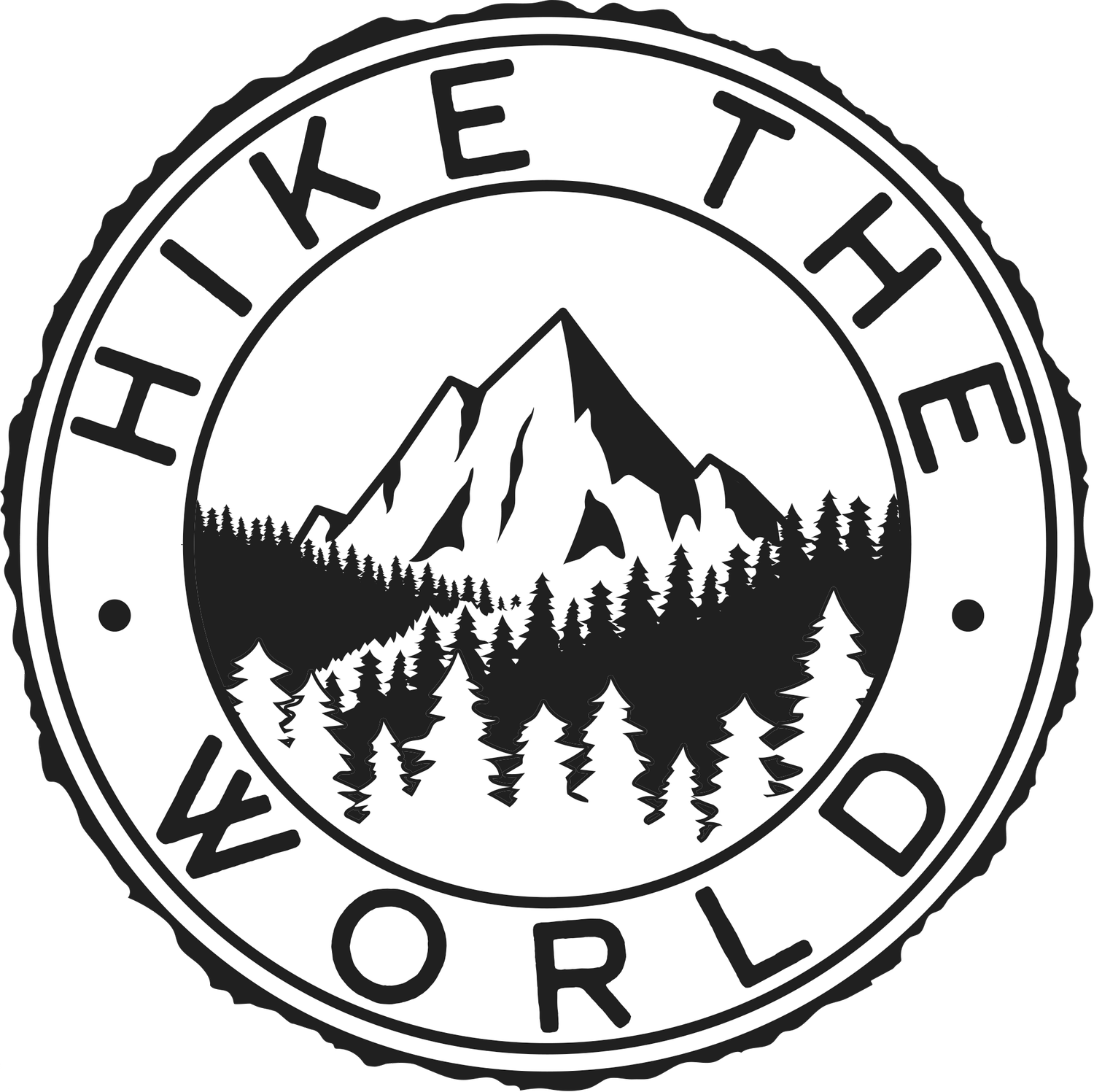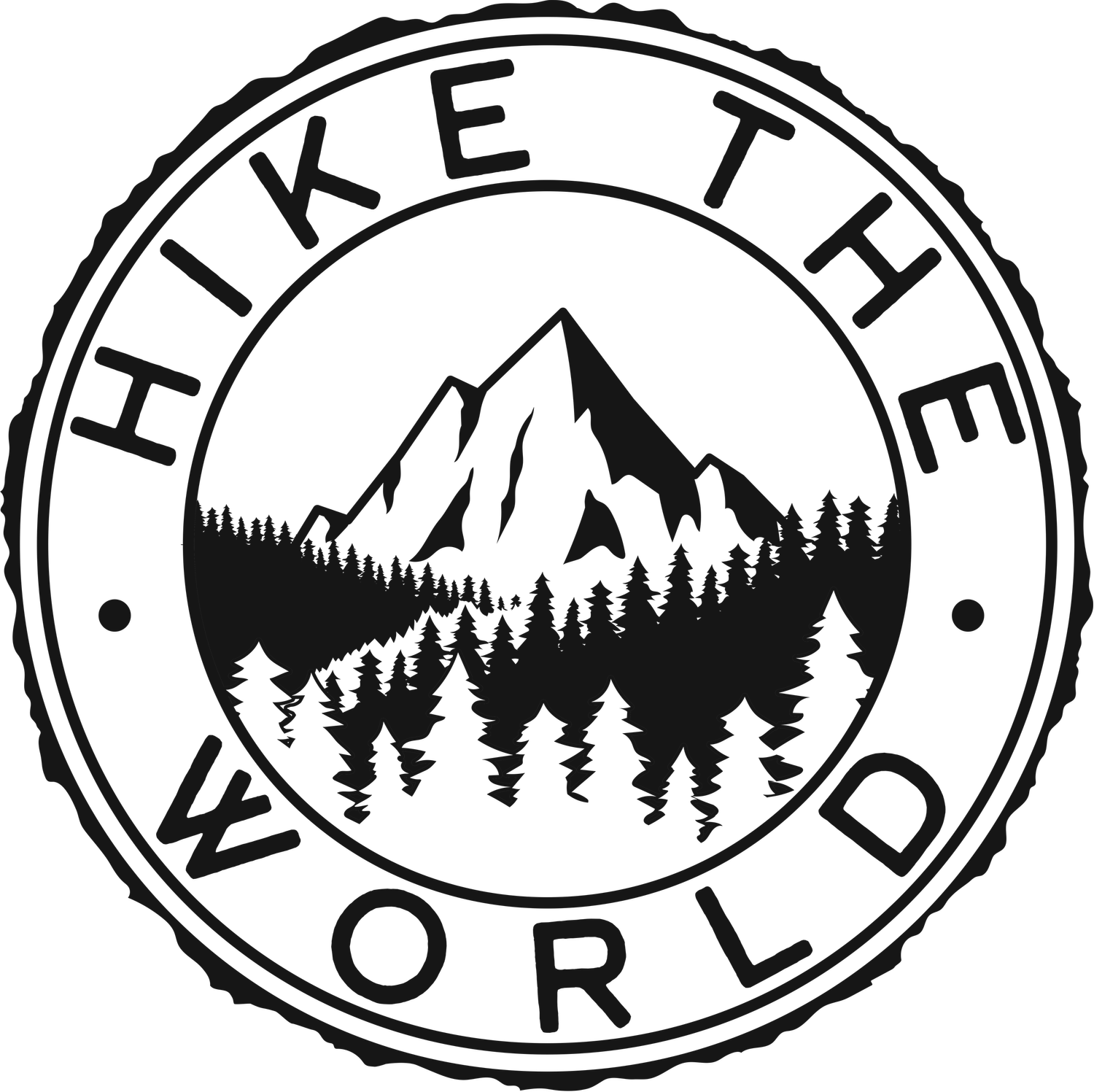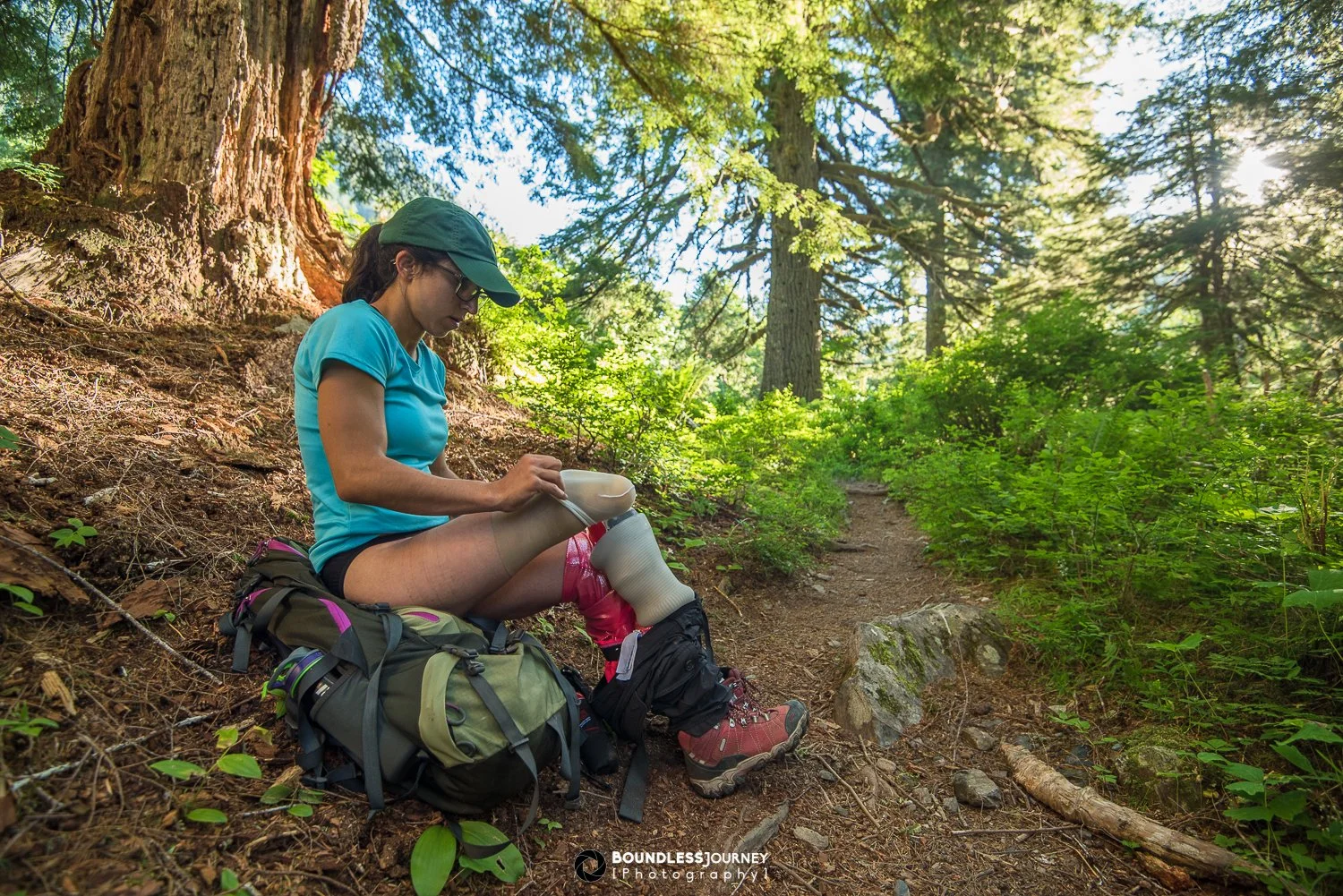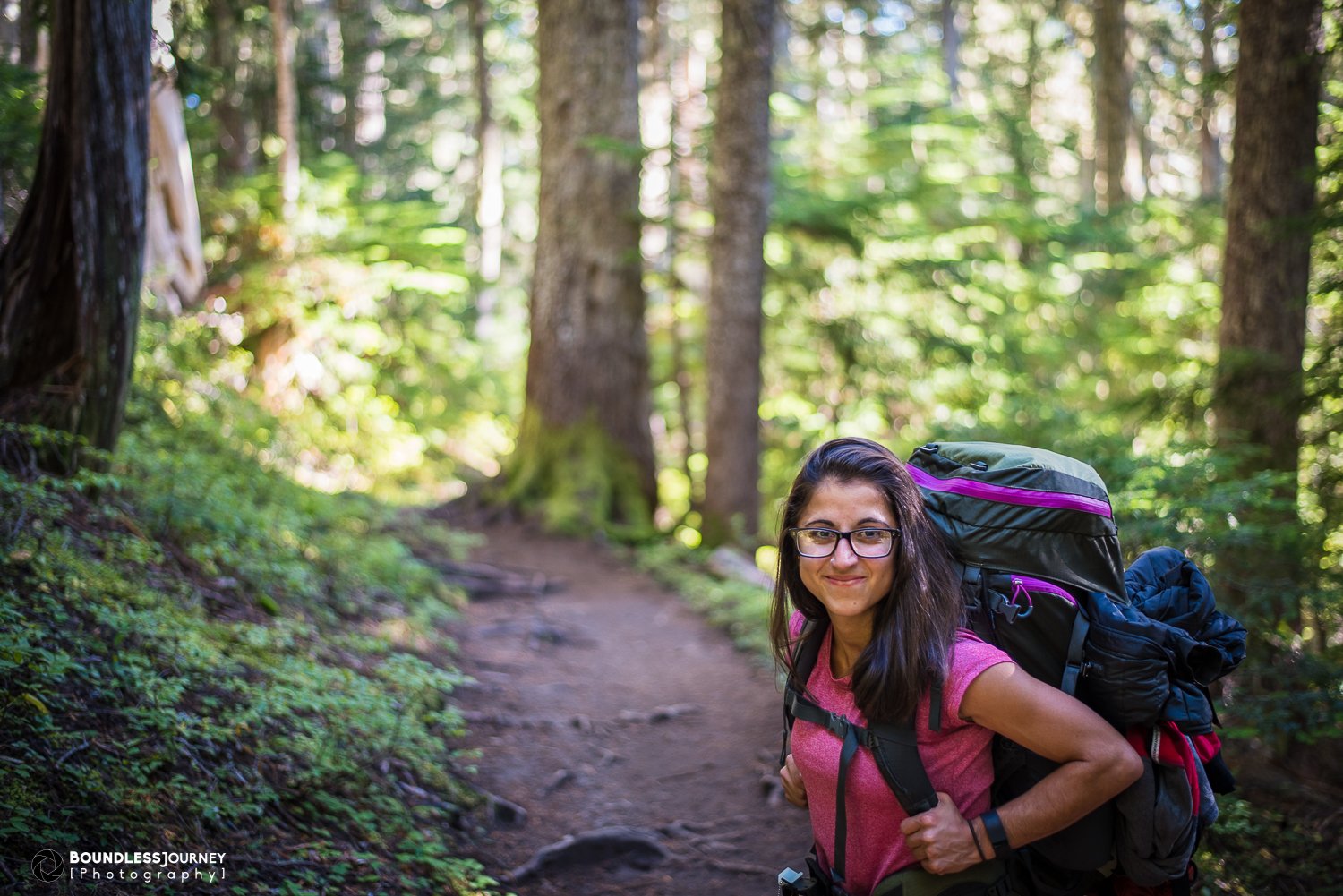Trail Therapy by Angelina
We promised to give you examples of amazing women throughout The Outdoor Journal Tour's Empowerment and Wellness campaign, #wehiketoheal. This week's article is no exception.
Angelina Boulicault is one of our first Hike the World ambassadors and an amazing woman. She is a hiker with a big heart, whose passion to get amputees outside and more active has impressed and humbled us. She has battled Post Traumatic Stress Disorder (PTSD), infection and depression. Like many of us, she has found that hikes, nature, and trails have played a big part in healing her.
Trail Therapy by Angelina Boulicault
When I woke up, I was in the ICU.
For a week, I’d been in a medically induced coma. I had a serious chest infection. My left lung had collapsed, and my right lung was partially full of fluid. When the doctors had attempted surgery to improve my condition, I lost so much blood that I needed a blood transfusion. And, under all of this stress, my only kidney was failing. I was breathing via a ventilator and was hooked up to countless tubes.
When I woke up, I felt like I hadn’t slept in a month and like I had been hit by a train. I ached all over. I was acutely aware of my diaphragm moving with each breath.
My very first day awake, a nurse asked if I was ready to start physical therapy. She said it was important to get moving since I had been completely sedentary for a week. That first day, I think I took about six steps. Then, I had to sit upright in that chair for 30 minutes. It was excruciating, and I wanted nothing more than to curl back up into my hospital bed. Everything hurt, even breathing.
Recovery was slow, and every setback made it harder to come positive. After more than a month in the hospital, I had to come to terms with not returning to school that semester. I filed paperwork to drop out of school. I felt like such a failure and saw such a long road of healing ahead of me. I went home and worked on recovering as I struggled with depression.
Both of my parents went back to work, and my sister was at school. I sat at home, alone. I was in such a bad place. My family was so grateful to still have me in their life, yet I was so angry to be stuck at home recovering. I felt like I wasn’t making progress. I only weighed about 75 pounds—I’d lost 20 pounds after a month in the hospital. Much of my recovery focused on getting stronger and increasing my activity.
A few weeks went by and I began to go outside and walk. My walks grew longer, and I got stronger. During a routine checkup, my doctor asked if I was doing okay mentally. I paused and thought about it.
I told her that I kept waking up in the middle of the night with nose bleeds. Sometimes, my mind would drift and I’d be back at the hospital. I would feel the pains I had felt while I was hospitalized. My hands hurt all the time from the memory of all the needles. After some of these flashbacks, I would often throw up or have a nosebleed. I told her I hadn’t talked about it because I just thought it was part of the recovery.
My doctor explained Post Traumatic Stress Disorder, PTSD, to me. She said that many people who go through a traumatic experience end up suffering from PTSD. She suggested therapy.
The flashbacks were so vivid. I kept thinking I was back in the hospital. It was a constant nightmare. It was time to try therapy.
I was also on medication for my heart, kidney, pancreas, and lungs; in addition to an anti-anxiety medication. I was severely underweight and overmedicated. I was slowly getting better but becoming so dependent on the medications. I felt like life was on pause and I was just waiting on the doctors to tell me I could take my next step. I felt so out of control; I hated it.
The only time I felt strong was on my walks. I was making good progress, but I soon grew bored with the same old flat streets. So I started going on short trails, which added some elevation gain and were more interesting. At first, the hikes felt difficult and I had to stop to catch my breath a lot; my lungs and heart were still recovering from the stress of infection. At first, I was worried about being able to even finish even a few miles on the trail. I could walk up and down hills, breathing the fresh air into my re-inflated lungs. I could get my heart beating faster and harder; it felt stronger. I felt stronger.
I found that I loved the serenity and the views out on the trail. I was in still in a dark place but the hiking was therapeutic. I wandered around the pines and watches squirrels chasing each other. I could think more clearly when I was hiking—and the effect lasted after the hike, too. I noticed that, if I didn’t get my time out on the trail, I was more likely to have a flashback. I really began to need trail time—both mentally and physically. I felt so at peace out there.
I eventually stopped having flashbacks. I was able to get off the medication.
A few years after my illness, I moved to the Northwest from the Midwest. Before I even moved, Enchanted Valley in the Olympics had been on my list to hike. It’s hard to even express how happy I was to live somewhere I could hop on a trail so easily. I worked through a number of hikes, further building up my strength and endurance; the Midwest doesn’t offer the elevation gain that you find in the Northwest.
Then, a few years after waking up in the ICU, I was able to hike 30 miles in a weekend on a trip to Enchanted Valley. It was the longest hike I had ever hiked, and I’d worked up to by hiking other trails in the state.
Along the trail, I heard a noise and I slipped into a fallen tree to watch. After a few minutes, a herd of about 25 elk roamed right by the tree I was hiding in. Calves and their parents were only feet from me. I felt so alive and so in tune with my body. My heart was beating so hard from the excitement and I felt so in control. I was stronger than ever; I wasn’t waiting for a doctor’s permission and I wasn’t relying on medications to keep me healthy. I was making my own memories.
The elevation wasn’t huge, and the hike wasn’t too advanced, but I was pushing myself. I hadn’t been much of a hiker before my health worsened but I found that hiking had healed a part of me. I was no longer reliving the past. I was moving onto bigger and better things.
-----------------------------------------------
Angelina has built an amazing website for amputees. We encourage you to check it out as it provides invaluable advice, information and resources. If you have any questions or want to talk to her about hiking as an amputee or which prosthetics to use, you can contact her at adaptiveamputees@gmail.com or follow her on Instagram. She is encouraging and friendly and we couldn't be happier to have her as a part of the Hike the World family. Stay tuned for more adventures from Angelina!
Some of the photos in this article were taken by the very talented Nick Martinson. You can check out his work here.





